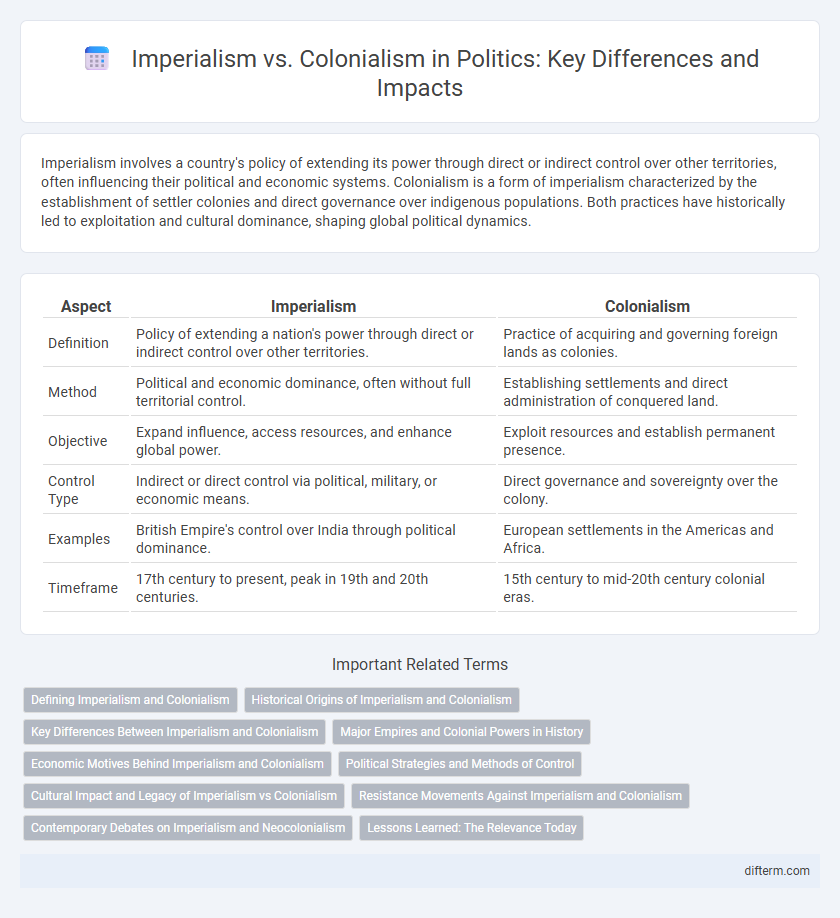Imperialism involves a country's policy of extending its power through direct or indirect control over other territories, often influencing their political and economic systems. Colonialism is a form of imperialism characterized by the establishment of settler colonies and direct governance over indigenous populations. Both practices have historically led to exploitation and cultural dominance, shaping global political dynamics.
Table of Comparison
| Aspect | Imperialism | Colonialism |
|---|---|---|
| Definition | Policy of extending a nation's power through direct or indirect control over other territories. | Practice of acquiring and governing foreign lands as colonies. |
| Method | Political and economic dominance, often without full territorial control. | Establishing settlements and direct administration of conquered land. |
| Objective | Expand influence, access resources, and enhance global power. | Exploit resources and establish permanent presence. |
| Control Type | Indirect or direct control via political, military, or economic means. | Direct governance and sovereignty over the colony. |
| Examples | British Empire's control over India through political dominance. | European settlements in the Americas and Africa. |
| Timeframe | 17th century to present, peak in 19th and 20th centuries. | 15th century to mid-20th century colonial eras. |
Defining Imperialism and Colonialism
Imperialism refers to a policy or ideology where a nation extends its power by acquiring territories or gaining control over other nations through diplomacy or military force. Colonialism specifically involves the establishment of settlements and direct governance of foreign lands by a mother country, often exploiting local resources and populations. Both concepts are linked in political discourse but differ in their mechanisms and historical manifestations.
Historical Origins of Imperialism and Colonialism
Imperialism originated in the late 19th century as European powers sought to expand their influence through direct or indirect political and economic control over weaker territories. Colonialism, rooted in earlier centuries, involved the establishment of settlements and exploitation of resources in distant lands, often justified by ideologies of racial and cultural superiority. Both imperialism and colonialism share intertwined historical origins linked to mercantilism, industrialization, and national rivalries driving European expansion across Africa, Asia, and the Americas.
Key Differences Between Imperialism and Colonialism
Imperialism involves a nation's policy of extending its power and influence through diplomacy or military force, often controlling multiple territories economically or politically without direct governance. Colonialism specifically refers to the practice of establishing and maintaining settlements or colonies in foreign lands, focusing on direct territorial control and exploitation of resources. The key difference lies in imperialism's broader scope of influence versus colonialism's direct governance and settlement of acquired territories.
Major Empires and Colonial Powers in History
Major empires such as the British, Spanish, and Ottoman expanded their influence through imperialism, exerting control over vast territories by establishing political and economic dominance without direct settlement. Colonial powers like France, Portugal, and the Dutch Empire implemented colonialism by settling populations and exploiting resources in regions including the Americas, Africa, and Asia. The distinction between imperialism and colonialism is crucial in analyzing the strategies and legacies of these historical powers, with imperialism embodying broader dominance and colonialism emphasizing territorial occupation and administration.
Economic Motives Behind Imperialism and Colonialism
Economic motives behind imperialism and colonialism primarily involved the control of raw materials, access to new markets, and opportunities for investment. Imperial powers sought to exploit colonies for valuable resources such as minerals, agricultural products, and cheap labor to fuel industrial growth and capitalist expansion. The pursuit of economic dominance drove rivalries among European nations, leading to the establishment of trading monopolies and the restructuring of indigenous economies to serve imperial interests.
Political Strategies and Methods of Control
Imperialism employs political strategies centered on indirect rule, leveraging local elites to maintain control while expanding influence without full territorial annexation. Colonialism relies on direct governance, establishing settler administrations that impose foreign legal systems and political structures to dominate populations. Both methods utilize economic exploitation and military presence to enforce authority, but imperialism often prioritizes strategic alliances and political manipulation over territorial occupation.
Cultural Impact and Legacy of Imperialism vs Colonialism
Imperialism often imposed centralized political control while facilitating cultural assimilation, leading to the widespread erosion of indigenous traditions and languages. Colonialism frequently resulted in direct exploitation and settlement, embedding racial hierarchies and economic dependency that persist in post-colonial societies. Both legacies contribute to ongoing socio-political tensions and identity struggles in formerly dominated regions.
Resistance Movements Against Imperialism and Colonialism
Resistance movements against imperialism and colonialism encompassed diverse strategies, including armed uprisings like the Mau Mau rebellion in Kenya and organized political campaigns led by figures such as Mahatma Gandhi in India. These movements challenged foreign domination by mobilizing local populations through nationalist ideologies, cultural revival, and demands for self-governance. The persistent resistance contributed to the decolonization wave in the mid-20th century, reshaping global political boundaries and asserting sovereignty for formerly colonized nations.
Contemporary Debates on Imperialism and Neocolonialism
Contemporary debates on imperialism and neocolonialism emphasize the persistence of economic and political dominance by powerful nations over developing countries through mechanisms such as multinational corporations, international financial institutions, and trade agreements. Scholars argue that neocolonial practices continue to shape global inequalities by restricting sovereignty and perpetuating dependency, despite formal political independence. Criticism of neoliberal globalization highlights how structural adjustment programs and debt dependency serve as modern tools of imperial control under the guise of development aid.
Lessons Learned: The Relevance Today
Imperialism and colonialism have left profound legacies in global political structures, highlighting the enduring impact of power imbalances and resource exploitation. Contemporary discussions on sovereignty, economic inequality, and cultural identity often reference historical imperialist policies to address ongoing neocolonial practices. Understanding these lessons is crucial for developing equitable international relations and promoting decolonization efforts in modern governance.
imperialism vs colonialism Infographic

 difterm.com
difterm.com